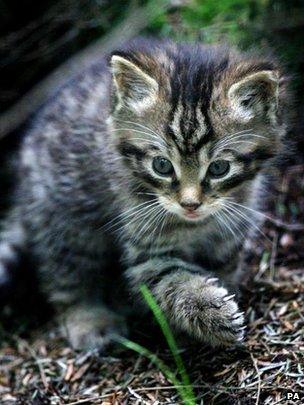Scottish wildcat could be extinct 'within two years'
- Published

The Scottish wildcat is now one of the world's rarest animals, the scientist said
A scientist who has developed a genetic test to identify pure Scottish wildcats has warned that the species could be extinct within two years.
Dr Paul O'Donoghue said cross breeding with feral and hybrid cats made extinction a certainty unless "urgent" conservation activity took place.
The University of Chester biologist said pure wildcats should be trapped.
He also suggested that private individuals could be keeping the "very best" wildcats as pets.
The senior lecturer in biology asked for these people to come forward and help with the conservation effort.
In remote and rural parts of the Highlands it is known for people to take wildcats that visit their properties into their care.
Dr O'Donoghue and his team have developed a test that can look at a small blood sample and scan all of the 63,000 genes that make up any individual cat.
The test then compares the genes against a genetic model of a pure wildcat, providing "definitive statistics" on the level of hybridisation present in the tested individual.
One of the major challenges for the project was finding reference samples of pure-bred Scottish wildcats.
In collaboration with Dr Andrew Kitchener, curator at National Museums Scotland, Dr O'Donoghue searched through hundreds of museum specimens in the Natural History Museums in Edinburgh and London, to find cats that showed no signs of hybridisation.
Dr O'Donoghue said: "In contrast to previous wildcat genetic work, only these pure wildcat samples were used for the reference samples.
"They spanned the past 140 years and are the very best wildcat specimens in existence."
But he added: "Our research shows that the plight of the wildcat is now so serious that unless urgent and targeted conservation activities take place, its extinction due to hybridisation is a certainty.
"Recent estimates suggest that fewer than 100 remain, making it one of the rarest animals in the world.
"Unless decisive action is taken, the wildcat could be declared extinct with the next 12 to 24 months."
Eyewitness reports
The biologist said the animal was now one of the rarest in the world.
He said it was of the "utmost importance" that large scale live trapping took place and cats found to be pure-bred wildcats then be placed in protected areas in the west Highlands.
In September last year, conservationists forecast that Scottish wildcats would be extinct in the wild within months as numbers of pure-bred cats had fallen to about 35 individuals.
A team put together by the Scottish Wildcat Association (SWA) reviewed 2,000 records of camera trap sightings, eyewitness reports and also road kills.
SWA said the analysis suggested there could be 35 wildcats - far fewer than previously thought.
Other research has estimated that there could be less than 400 pure-bred cats.
Earlier in 2012, a report on a project funded by Scottish Natural Heritage (SNH) estimated that there were 150 breeding pairs left.
Disease and inter-breeding with domestic and feral cats are among the main threats to numbers of pure-bred wildcats.
- Published26 September 2012
- Published13 September 2012
- Published31 August 2012
- Published29 August 2012
- Published24 April 2012
- Published24 April 2012
- Published10 January 2012